Photo: Dan MacMedan/WireImage
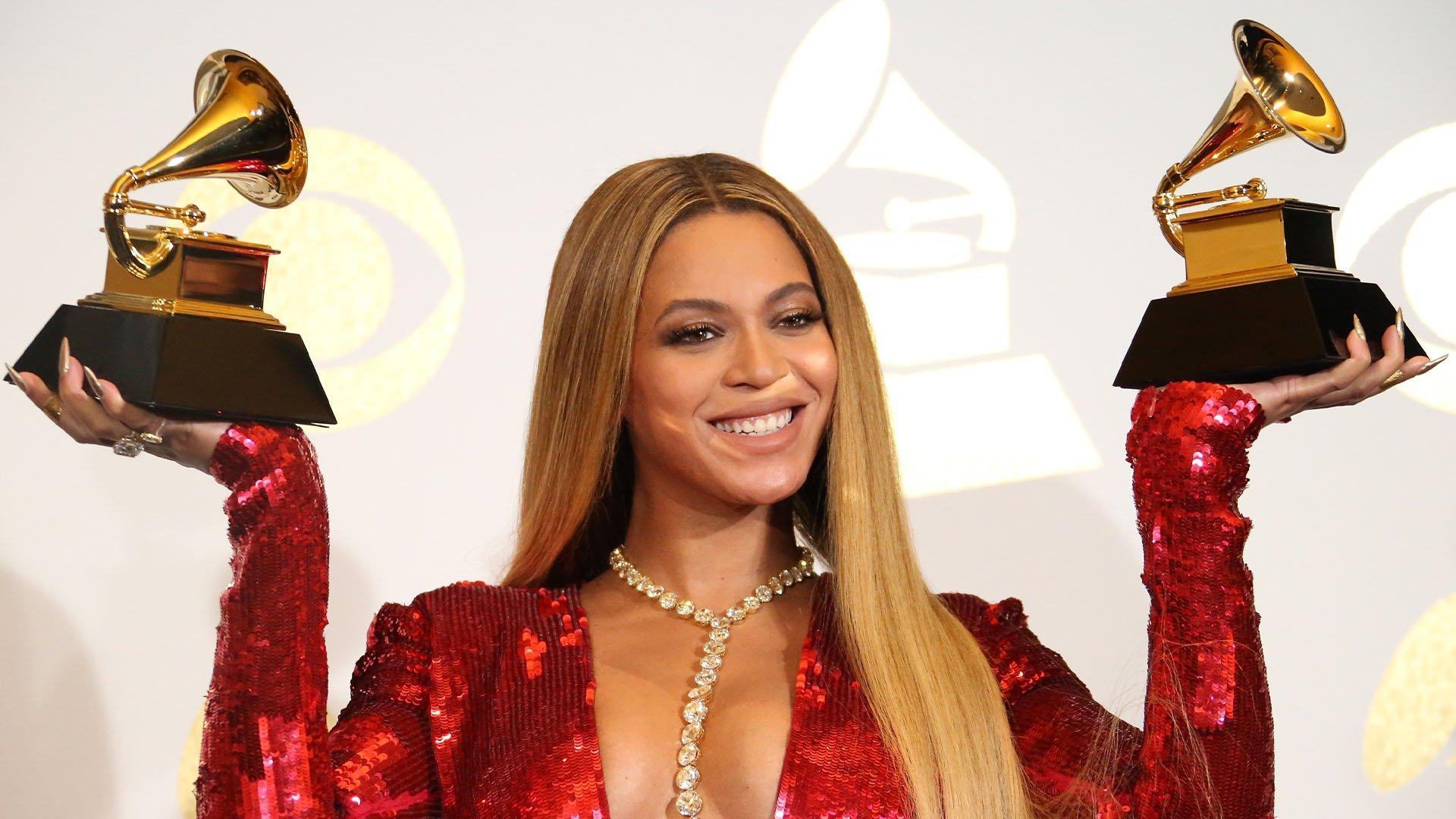
video
GRAMMY Rewind: Beyoncé Strives For Accountability And Change After Winning A GRAMMY For 'Lemonade' In 2017
As Beyoncé accepted the GRAMMY for Best Urban Contemporary Album in 2017, she stressed that it's vital to "learn from the past and recognize our tendencies to repeat our mistakes."
At the height of America's tense political climate, Beyoncé's Lemonade brought confidence to Black women nationwide silenced by misogynoir. It was a celebration of unapologetic femininity and southern culture while also taking back the power in relationships stained by infidelity and generational trauma. As Beyoncé explained in her 2017 GRAMMY acceptance speech, the intention of Lemonade was "to give a voice to our pain, our struggles, our darkness, and our history."
In this episode of GRAMMY Rewind, we turn back the clock to the evening Beyoncé made her empowering speech after winning Best Urban Contemporary Album at the 59th GRAMMY Awards. Fresh off of her iconic, nine-minute performance of Lemonade's vulnerable deep cuts, "Love Drought" and "Sandcastles," Beyoncé was glowing as she took the stage to accept her golden gramophone.
"Thank you to everyone who worked so hard to beautifully capture the profundity of deep southern culture," Beyoncé proudly praised before acknowledging her husband, kids, and fans.
"It's important to me to show images to my children that reflect their beauty, so they can grow up in a world where they look in the mirror... and have no doubt that they're beautiful, intelligent and capable," Beyoncé said. "This is something that I want for every child of every race. And I feel it's vital that we learn from the past and recognize our tendencies to repeat our mistakes."
Press play on the video above to watch the entirety of Beyoncé's thoughtful acceptance speech for Best Urban Contemporary Album at the 2017 GRAMMY Awards, and keep checking back to GRAMMY.com for more new episodes of GRAMMY Rewind.
Billy Porter Is Ready To Show Fans His True Musical Side: "You're Not Gonna Want To Stop Listening"
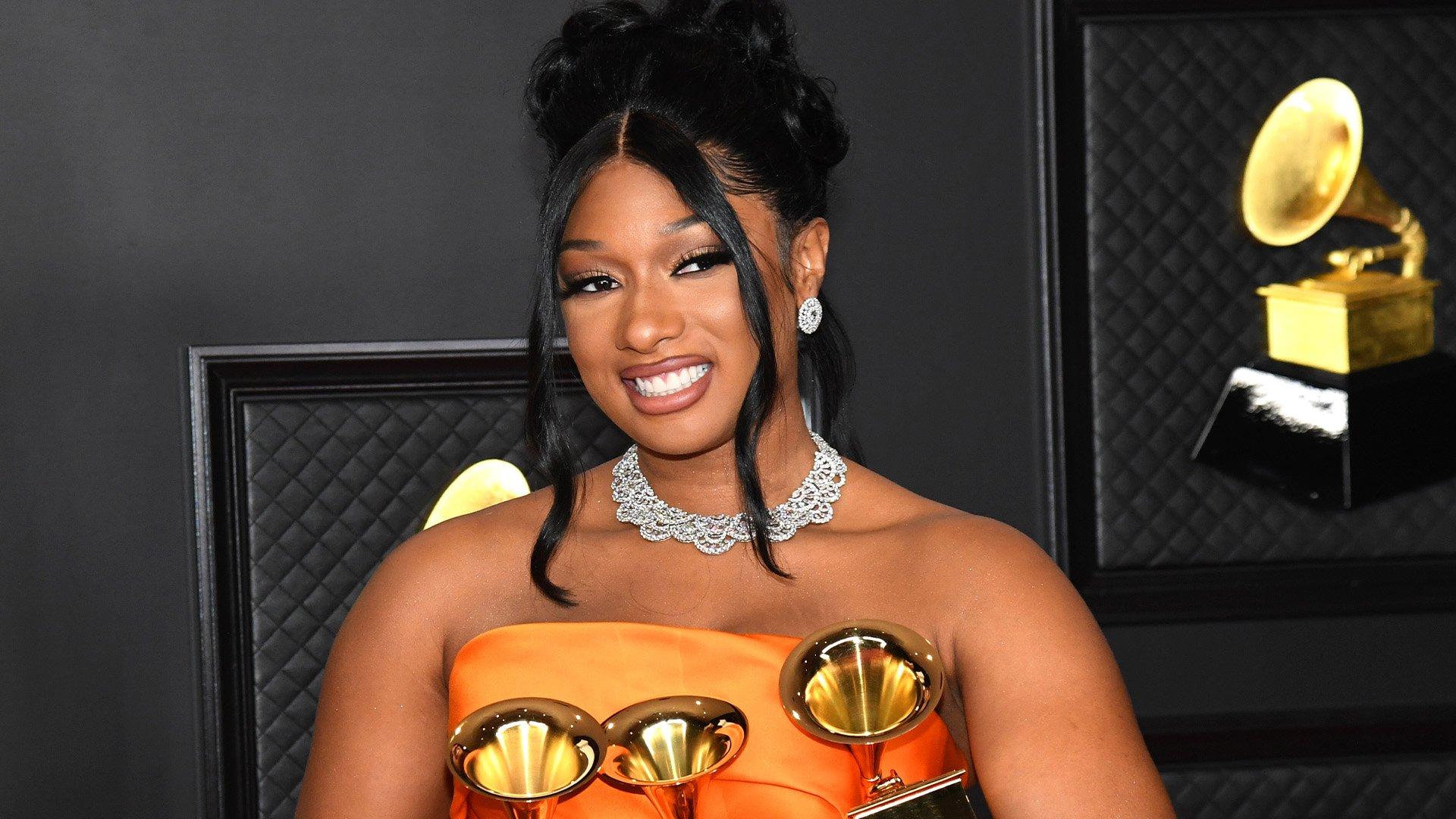
Photo: Kevin Mazur/Getty Images for The Recording Academy
video
GRAMMY Rewind: Megan Thee Stallion Went From "Savage" To Speechless After Winning Best New Artist In 2021
Relive the moment Megan Thee Stallion won the coveted Best New Artist honor at the 2021 GRAMMYs, where she took home three golden gramophones thanks in part to her chart-topping smash "Savage."
In 2020, Megan Thee Stallion solidified herself as one of rap's most promising new stars, thanks to her hit single "Savage." Not only was it her first No. 1 song on the Billboard Hot 100, but the "sassy, moody, nasty" single also helped Megan win three GRAMMYs in 2021.
In this episode of GRAMMY Rewind, revisit the sentimental moment the Houston "Hottie" accepted one of those golden gramophones, for Best New Artist.
"I don't want to cry," Megan Thee Stallion said after a speechless moment at the microphone. Before starting her praises, she gave a round of applause to her fellow nominees in the category, who she called "amazing."
Along with thanking God, she also acknowledged her manager, T. Farris, for "always being with me, being by my side"; her record label, 300 Entertainment, for "always believing in me, sticking by through my craziness"; and her mother, who "always believed I could do it."
Megan Thee Stallion's "Savage" remix with Beyoncé also helped her win Best Rap Song and Best Rap Performance that night — marking the first wins in the category by a female lead rapper.
Press play on the video above to watch Megan Thee Stallion's complete acceptance speech for Best New Artist at the 2021 GRAMMY Awards, and remember to check back to GRAMMY.com for more new episodes of GRAMMY Rewind.
Black Sounds Beautiful: How Megan Thee Stallion Turned Viral Fame Into A GRAMMY-Winning Rap Career
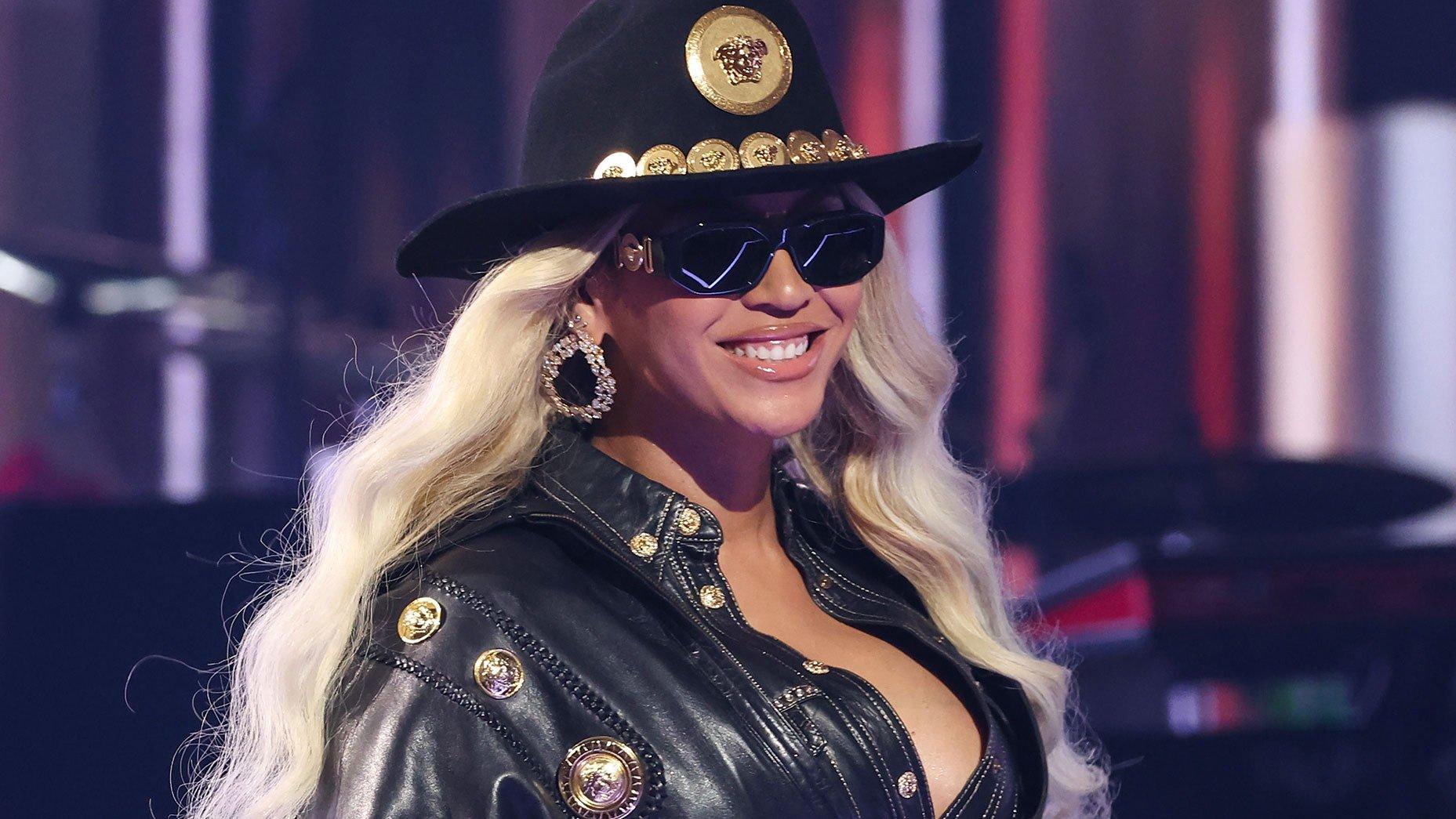
Photo: Kevin Winter/Getty Images for iHeartRadio
feature
Beyond Country: All The Genres Beyoncé Explores On 'Cowboy Carter'
On 'COWBOY CARTER,' Beyoncé is free. Her eighth studio album is an unbridled exploration of musical genres — from country to opera and R&B — that celebrates the fluidity of music and her Texas roots.
"Genres are a funny little concept, aren't they? In theory, they have a simple definition that's easy to understand. But in practice, well, some may feel confined."
With those words, spoken on "SPAGHETTII" by Linda Martell — the first commercially successful Black female artist in country music and the first to play the Grand Ole Opry solo — Beyoncé provides a proxy response to her original call on Instagram 10 days before COWBOY CARTER was released: "This ain’t a Country album. This is a “Beyoncé” album."
She delivered on that promise with intent. Through a mix of homage and innovation, Beyoncé's latest is a 27-track testament to her boundless musicality and draws from a rich aural palette. In addition to its country leanings, COWBOY CARTER includes everything from the soulful depths of gospel to the intricate layers of opera.
Beyoncé's stance is clear: she's not here to fit into a box. From the heartfelt tribute in "BLACKBIIRD" to the genre-blurring tracks like "YA YA," Beyoncé uses her platform to elevate the conversation around genre, culture, and history. She doesn't claim country music; she illuminates its roots and wings, celebrating the Black artists who've shaped its essence.
The collective album proves no genre was created or remains in isolation. It's a concept stoked in the words of the opening track, "AMERIICAN REQUIEM" when Beyonce reflects, "Nothing really ends / For things to stay the same they have to change again." For country, and all popular genres of music to exist they have to evolve. No sound ever stays the same.
COWBOY CARTER's narrative arc, from "AMERICAN REQUIEM" to "AMEN," is a journey through American music's heart and soul, paying tribute to its origins while charting a path forward. This album isn't just an exploration of musical heritage; it's an act of freedom and a declaration of the multifaceted influence of Black culture on American pop culture.
Here's a closer look at some of some of the musical genres touched on in act ii, the second release of an anticipated trilogy by Beyoncé, the most GRAMMY-winning artist of all-time:
Country
Before COWBOY CARTER was even released, Beyoncé sparked critical discussion over the role of herself and all Black artists in country music. Yet COWBOY CARTER doesn't stake a claim on country music. Rather, it spotlights the genre through collaborations with legends and modern icons, while championing the message that country music, like all popular American music and culture, has always been built on the labor and love of Black lives.
It's a reckoning acknowledged not only by Beyoncé's personal connection to country music growing up in Texas, but the role Black artists have played in country music rooted in gospel, blues, and folk music.
Enter The World Of Beyoncé
Country legends, Dolly Parton ("DOLLY P", "JOLENE," and "TYRANT"), Willie Nelson ("SMOKE HOUR" and "SMOKE HOUR II"), and Martell ("SPAGHETTII and "THE LINDA MARTELL SHOW") serve mainly as spoken-word collaborators, becoming MCs for Queen Bey. Some of the most prolific country music legends receiving her in a space where she has been made to feel unwelcome in music (most notably with the racism surrounding her 2016 CMA performance of "Daddy Lessons" with the Dixie Chicks) provides a prolific release of industry levies. Martell, a woman who trod the dark country road before Bey, finally getting her much-deserved dues appears as an almost pre-ordained and poetic act of justice.
"BLACKBIIRD," a version of the Beatles' civil rights era song of encouragement and hope for the struggle of Black women is led softly by Beyoncé, backed by a quartet of Black female contemporary country songbirds: Tanner Adell, Brittney Spencer, Tiera Kennedy, and Reyna Roberts.
Beyoncé holds space for others, using the power of her star to shine a light on those around her. These inclusions rebuke nay-sayers who quipped pre-release that she was stealing attention from other Black country artists. It also flies in the faces that shunned and discriminated against her, serving as an example of how to do better. The reality that Beyoncé wasn't stealing a spotlight, but building a stage for fellow artists, is a case study in how success for one begets success for others.
Read more: 8 Country Crossover Artists You Should Know: Ray Charles, The Beastie Boys, Cyndi Lauper & More
Gospel, Blues, & Folk (American Roots)
As is Beyoncé's way, she mounts a case for country music with evidence to back up her testimony. She meanders a course through a sequence of styles that serve as the genre's foundation: gospel, blues, and folk music.
"AMERIICAN REQUIEM" and "AMEN" bookend the album with gospel-inspired lyrics and choir vocals. The opener sets up a reflective sermon buoyed by the sounds of a reverberating church organ, while the closer, with its introspective lyrics, pleads for mercy and redemption. The main verse on "AMEN", "This house was built with blood and bone/ The statues they made were beautiful/ But they were lies of stone," is complemented by a blend of piano, and choral harmonies.
Hymnal references are interlaced throughout the album, particularly in songs like "II HANDS II HEAVEN" and in the lyrical nuances on "JUST FOR FUN." In the later track, Beyoncé's voice soars with gratitude in a powerful delivery of the lines, "Time heals everything / I don't need anything / Hallelujah, I pray to her."
The gospel-inspired, blues-based "16 CARRIAGES" reflects the rich history of country songs borrowing from the blues while simultaneously calling back to songs sung by field laborers in the colonial American South. "Sixteen dollars, workin' all day/ Ain't got time to waste, I got art to make" serves as the exhausted plea of an artist working tirelessly long hours in dedication to a better life.
Rhiannon Giddens, a celebrated musician-scholar, two-time GRAMMY winner, and Pulitzer Prize recipient, infuses "TEXAS HOLD 'EM" with her profound understanding of American folk, country, and blues. She plays the viola and banjo, the latter tracing its origins to Sub-Saharan West Africa and the lutes of ancient Egypt. Through her skilled plucking and bending of the strings, Giddens bridges the rich musical heritage of Africa and the South with the soul of country, blues, and folk music.
Pop, Funk, Soul & Rock 'n' Roll
All in, Beyoncé is a pop star who is wrestling with labels placed on her 27-year career in COWBOY CARTER. Fittingly, she brings in two other pop artists known for swimming in the brackish water between country and pop, Miley Cyrus and Post Malone. Her intentional inclusion of two artists who have blurred genres without much cross-examination begs the question, Why should Beyoncé's sound be segregated to a different realm?
On "YA YA" Linda Martell returns as the listener's sonic sentinel, introducing the track like a lesson plan: "This particular tune stretches across a range of genres. And that’s what makes it a unique listening experience." The tune sinks into the strummed chords of Nancy Sinatra's "These Boots Are Made for Walkin'" before leaping into a fiery dance track that features reimagined lyrics from the Beach Boys, with soulful vocal flourishes and breaks that show the throughline connection between '60s era rock, funk, and pop music.
Robert Randolph lends his hands on "16 CARRIAGES" with a funk-infused grapple on his pedal-steel guitar. It's a style he honed through his early years touring and recording with his family band and later in his career as an in-demand collaborator working with names including the Allman Brothers, and Norah Jones.
The lesson is solidified as the album transitions into an interlude on "OH LOUISIANA," featuring a sped-up sample of a classic track by Chuck Berry. This moment emphasizes the pop superstar's nod to civil rights era music history, spotlighting a controversial artist celebrated for his pioneering contributions to rock 'n' roll. (It's a part of music history Beyoncé knows well, after starring as Etta James in the 2008 film Cadillac Records, a veiled biopic of the legendary Chicago label Chess Records.)
Classical & Opera
Opera was missing from many listeners' Beyoncé Bingo card, but didn't surprise those that know her background. Beyoncé was trained for over a decade starting at an early age by her voice teacher David Lee Brewer, a retired opera singer who once lived with the Knowles family.
COWBOY CARTER gives sing-along fans a 101 opera class with "DAUGHTER." In Italian, Beyoncé sings passages from the 1783 Italian opera "Caro Mio Ben," composed by Giuseppe Tommaso Giovanni Giordani. The aria is a classic piece of vocal training that fittingly shows off her full range — taking us back to the earliest days of her vocal teachings.
Hip-Hop & R&B
Midway through the album on "SPAGHETTII" Beyoncé announces, "I ain't no regular singer, now come get everythin' you came for," landing right where expectations have confined her: in the throes of a romping beat, experimenting with sounds that blend hip-hop with R&B and soul. The track notably highlights the talent of Nigerian American singer/rapper Shaboozey, who also shows up to the rodeo on "SWEET HONEY BUCKIN'" brandishing his unique mix of hip-hop, folk-pop, and country music.
Beyoncé worked with longtime collaborator Raphael Saadiq on this album, a career legend in the R&B industry, who lends his mark to several tracks on which he wrote, produced, and played multiple instruments. Beyoncé also utilizes the Louisiana songwriter Willie Jones on "JUST FOR FUN," an artist who draws on a contemporary blend of country, Southern rap, and R&B in the hymnal ballad.
The violin-heavy "TYRANT" and "SPAGHETTII" both underscore hip-hop's long love affair with the classical string instrument (See: Common's "Be," and Wu Tang Clan's "Reunited" as the tip of that particular iceberg) with a blend of soulful R&B lyrics paired with beat-based instrumentalization.
In a world quick to draw lines and label sounds, Beyoncé's COWBOY CARTER stands as a vibrant mosaic of musical influence and innovation. Ultimately, Beyoncé's COWBOY CARTER isn't seeking anyone's acceptance. As a Texan once told she didn't belong, her critical response claps back at this exclusion. It's also a reminder that in the hands of a true artist, music is limitless.
Run The World: Why Beyoncé Is One Of The Most Influential Women In Music History
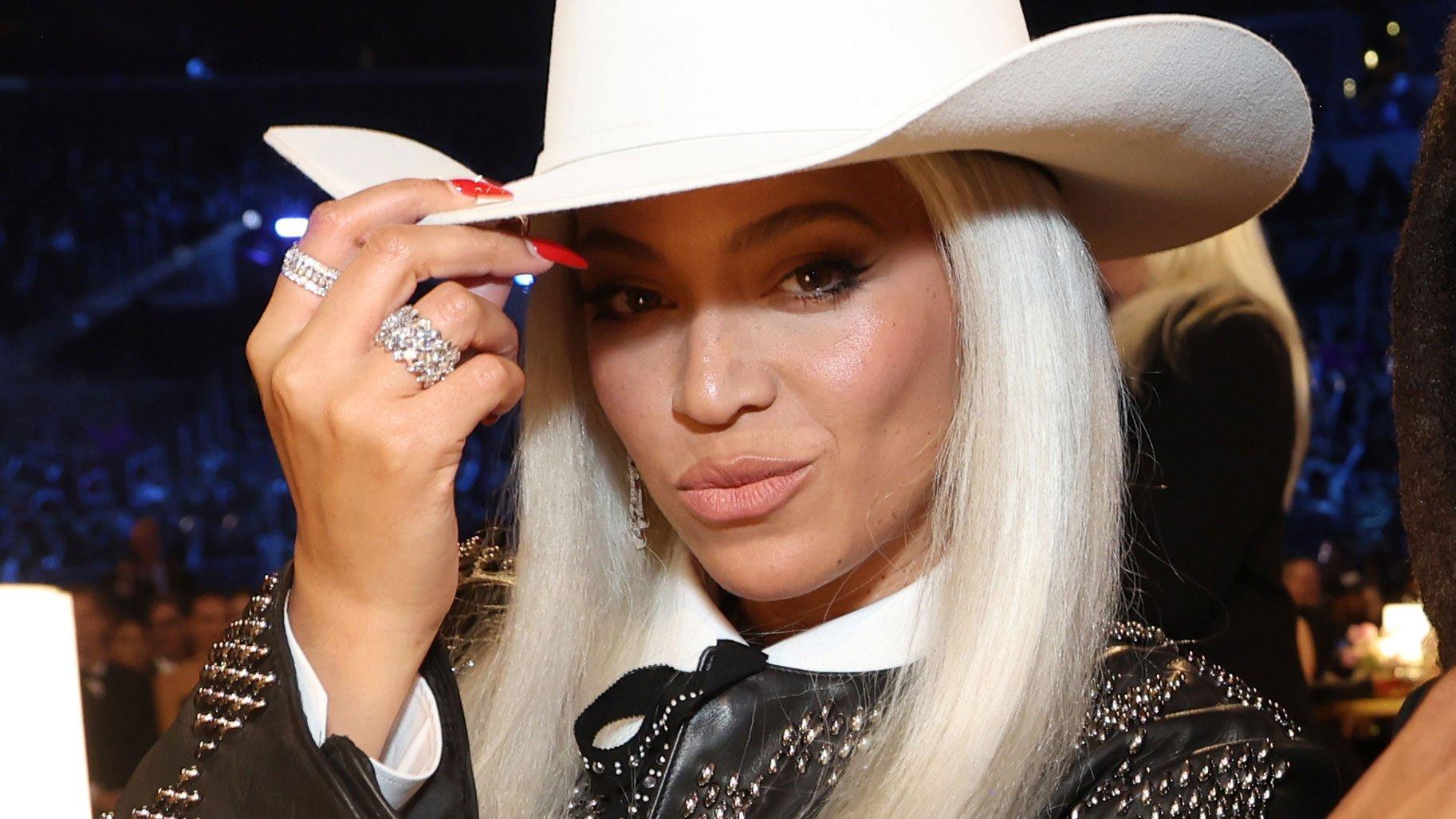
Photo: Kevin Mazur/Getty Images for The Recording Academy
list
Beyoncé Is The Genre-Bending Queen On 'Cowboy Carter': 5 Takeaways From Her New Album
On 'act ii' of her three-part album trilogy, Beyoncé explores the world of country and beyond — and makes a statement with every track.
When Beyoncé released RENAISSANCE in July 2022, she revealed that the album would be part of a "three-act project." One year and eight months later, she delivered on her promise in a big, bold way with act ii: COWBOY CARTER.
The expansive 27-track project finds the star experimenting with country, folk and Americana, pushing the boundaries of genre in a way she never has before — and, in classic Bey fashion, serving up a poignant response to naysayers.
"It was born out of an experience that I had years ago where I did not feel welcomed…and it was very clear that I wasn't," she shared in an Instagram post the week before the album's release. "But, because of that experience, I did a deeper dive into the history of Country music and studied our rich musical archive."
From thoughtful cameos to old-school instrumentation, COWBOY CARTER is the culmination of everything that makes Beyoncé one of the most influential artists of her time, flexing her knack for statement pieces as well as her versatility.
Here are five key takeaways from Beyoncé's long-awaited new album, COWBOY CARTER.
It's Not Country, It's KNTRY
Beyoncé revealed the COWBOY CARTER track listing in a rodeo-inspired concert flyer posted to Instagram on March 27. The artwork shared an important tag at the bottom: "Brought to you by KNTRY Radio Texas."
KNTRY Radio is a fantasy station with a wide open format created for COWBOY CARTER, and hosted by Willie Nelson in two short "SMOKE HOUR" interludes. Throughout the album, you'll hear samples of old songs by Chuck Berry and other classic artists.
As Beyoncé stated in another pre-release Instagram post, COWBOY CARTER isn't a country album. Instead, popular styles are blended together in surprising ways to create a new sound that's purely Beyoncé. (There's even a moment, on "DAUGHTER," where she sings a verse from a famous Italian opera called "Caro Mio Ben.")
Whether through an intro, an interlude or a powerful verse, it's clear that Beyoncé and her guests are trying to open minds musically with these songs. "If there's one thing you can take away from our set today, let it be this," Nelson said in the second of his two "SMOKE HOUR" radio-style interludes on the album. "Sometimes you don't know what you like and someone you trust turns you on to some real good s—. And that, ladies and gentlemen, is why I'm here."
It's A Unique Continuation Of Her Mission
COWBOY CARTER begins the same way as it ends, with Beyoncé proclaiming, "Them big ideas are buried here, Amen," in the intro of opener "AMERICAN REQUIEM," and then "Them old ideas are buried here, Amen" in the last line of closer "AMEN."
Those statements reflect exactly what Beyoncé set out to do with COWBOY CARTER: celebrate the Black community's roots within the country space, while addressing the lack of cultural acceptance of it. The album celebrates Blackness in the way she's always done, but in a way that feels even more revolutionary.
This is perhaps best exhibited in the trap-infused track "SPAGHETTII." "Genres are a funny little concept, aren't they?" asks Linda Martell — who was the first Black woman soloist to appear at the Grand Ole Opry — on the song's intro. "In theory, they have a simple definition that's easy to understand/ But in practice, well, some may feel confined."
As Beyoncé adds in the first verse, "Now we on a mission, tried to turn me to the opposition/ I'm appalled 'bout the proposition/ Y'all been played by the plagiaristic, ain't gonna give no clout addiction my attention."
Beyoncé has long been at the forefront of honoring Black culture, and COWBOY CARTER is her most boundary-pushing addition to the conversation yet — and she hopes to change the "old ideas" into "big ideas."
It Takes Her Cinematic Love To The Next Level
It's no secret that Beyoncé loves her visuals. Though COWBOY CARTER isn't a visual album like some of her previous releases, a press release revealed that each of the songs on the album are inspired by Western films. In a statement, Beyoncé named five specific films as primary influences: The Harder They Fall, Killers of the Flower Moon, Urban Cowboy, The Hateful Eight, and Five Fingers For Marseilles.
Several of the COWBOY CARTER visuals have elements of Western films, from the desert and mountainous landscapes of "AMERIICAN REQUIEM" and "OH LOUISIANA" to the rainy ashtray in "AMEN." And it's likely not a coincidence that a track called "SPAGHETTII" ended up on an album inspired by Westerns.
Beyoncé even made a new catchphrase out of the most famous Western movie actor of all time on "BODYGUARD," where she declares she'll "John Wayne that ass."
It's Her Most Organic Sound Yet
Pivoting from the electronic landscape of RENAISSANCE, Beyoncé favors analog instruments over digital sounds on COWBOY CARTER. As "TEXAS HOLD 'EM" foreshadowed, there's plenty of banjo, boot-stomping beats and guitar plucks — and even Beyoncé's fingernails as percussion — across the album.
Raw instrumentation is also sprinkled throughout, particularly on "FLAMENCO" and her stunning cover of the Beatles' "Blackbird" (whose title is given an act ii twist as "BLACKBIIRD"). And if anything sounds a little unpolished, Beyoncé wants you to know it was completely intentional.
"With artificial intelligence and digital filters and programming, I wanted to go back to real instruments, and I used very old ones," Beyoncé explained in a press statement. "I didn't want some layers of instruments like strings, especially guitars, and organs perfectly in tune. I kept some songs raw and leaned into folk. All the sounds were so organic and human, everyday things like the wind, snaps and even the sound of birds and chickens, the sounds of nature."
It's Another Family Affair
Now that Beyoncé's first-born daughter, Blue Ivy Carter, has played a prominent role in her mom's career — winning a GRAMMY in 2021 for her part in "Brown Skin Girl" and famously dancing on the RENAISSANCE World Tour — it was time for her little sister to shine.
Six-year-old Rumi Carter contributes an intro on "PROTECTOR," by asking Bey if she can "hear the lullaby." Though Rumi isn't featured in the rest of the track, hearing her voice at the beginning makes the song's sweet sentiment all the more impactful: "And I will lead you down that road if you lose your way/ Born to be a protector," Beyoncé sings on the chorus.
With so much to uncover in COWBOY CARTER, Beyoncé already has the anticipation high for the final part of her album trilogy. Will act iii feature Rumi's twin brother, Sir Carter? Will the rumors of Beyoncé exploring her rock side be true? We'll hopefully find out soon enough, but for now, get lost in the world of COWBOY CARTER — a testament to Beyoncé's prowess as an ever-evolving trailblazer.
A Brief History Of Black Country Music: 11 Important Tracks From DeFord Bailey, Kane Brown & More
Enter The World Of Beyoncé
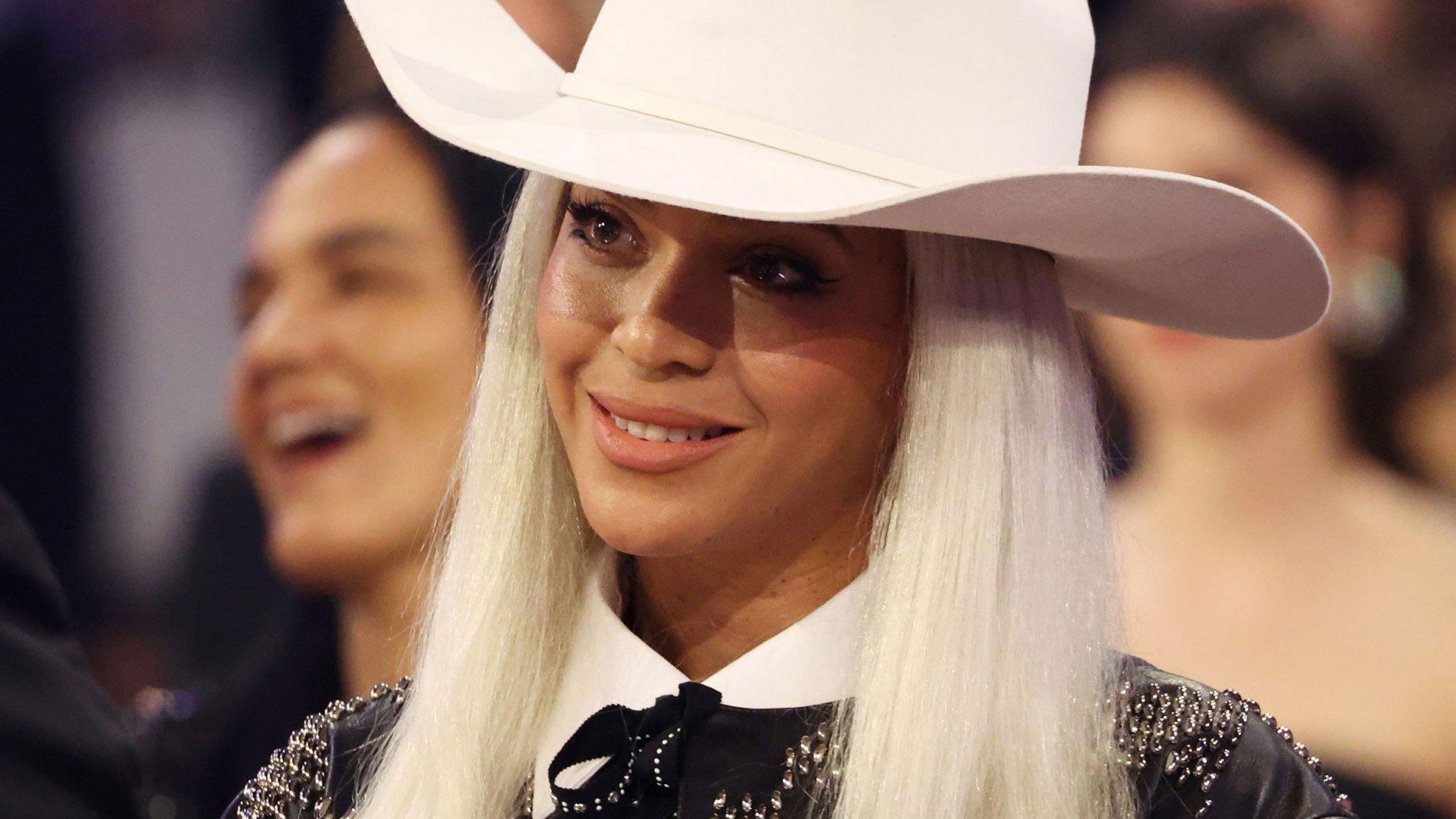
Photo: Kevin Mazur/Getty Images for The Recording Academy
news
Beyoncé's New Album 'Cowboy Carter' Is Here: Check Out The Featured Artists, Cover Songs, And Tracklist
Beyoncé's highly anticipated 'COWBOY CARTER' opens up a Pandora's box of American lore, and the deep connections between Blackness and country music. Here's the rundown of the album's featured artists, cover songs and tracklisting.
Beyoncé's act ii is upon us — say hello to COWBOY CARTER.
On March 29, the 32-time GRAMMY winner unleashed the follow-up to her acclaimed 2022 album, RENAISSANCE. While COWBOY CARTER hints "Bey goes country," the LP is more of a psychedelic opus, with glimmers of country twang and style.
Across a sprawling 27-song tracklist of inspired originals flecked with covers and interpolations, Queen Bey takes us on a rodeo ride through so many musical universes, paying homage to the Beatles, Chuck Berry, Willie Nelson, Dolly Parton, Linda Martell, and more.
Clearly, there's a treasure trove here — more than enough to keep the Beyhive abuzz throughout 2024. GRAMMY.com is here to help you pore over every twangy lick, mega-guest star and lyrical implication.
As you dive into Beyoncé's astonishing new album, read on for some of the fundamentals of COWBOY CARTER.
Enter The World Of Beyoncé
The Tracklisting
Two days prior to COWBOY CARTER's release, Bey released the tracklist — fittingly, in the form of a rodeo poster. And much to the delight of the Beyhive, it's nearly double the length of its 16-track predecessor, RENAISSANCE.
Check out the rodeo poster, as well as the complete track listing, below.
AMERIICAN REQUIEM
BLACKBIIRD
16 CARRIAGES
PROTECTOR
MY ROSE
SMOKE HOUR WILLIE NELSON
TEXAS HOLD 'EM
BODYGUARD
DOLLY P
JOLENE
DAUGHTER
SPAGHETTII
ALLIGATOR TEARS
SMOKE HOUR II
JUST FOR FUN
II MOST WANTED
LEVII'S JEANS
FLAMENCO
THE LINDA MARTELL SHOW
YA YA
OH LOUISIANA
DESERT EAGLE
RIIVERDANCE
II HANDS II HEAVEN
TYRANT
SWEET HONEY BUCKIIN'
AMEN
The Cover Songs
Among two dozen dazzling Beyoncé originals, COWBOY CARTER features covers of the Beatles' "Blackbird," Dolly Parton's "Jolene" and Chuck Berry's "Oh Louisiana."
"BLACKBIIRD" (retitled from "Blackbird," with an act ii flavor) is a Paul McCartney song, credited to Lennon-McCartney and featured on 1968's The Beatles, commonly known as The White Album. The song's civil rights inspiration makes it more than a worthy selection: the use of McCartney's original guitar and foot-tapping track makes it especially ear-grabbing.
"JOLENE" is a Dolly Parton classic, similarly given symphonic heft by Bey; Parton offers a radio-like intro on the COWBOY CARTER rendition.
In Parton's pre-"JOLENE" intro, "DOLLY P," she connects "Jolene" to Bey's immortal line "Becky with the good hair" from the Lemonade track "Sorry": "You know that hussy with the good hair you sing about? Reminded me of someone I knew back when, except she has flamin' locks of auburn hair. Bless her heart. Just a hair of a different color, but it hurts just the same."
"OH LOUISIANA" is a Chuck Berry deep cut from 1971's undersung San Francisco Dues; a flicker of Berry's "Maybellene" appears in "SMOKE HOUR WILLIE NELSON," which also features interpolations of Roy Hamilton's "Don't Let Go" and Sister Rosetta Tharpe's "Down By The River Side."
Similarly, "YA YA" contains glimmers of Tommaso Giordani's "Caro Mio Ben," Lee Hazelwood's "These Boots Are Made For Walkin'," and the Beach Boys' "Good Vibrations."
The Guests
Beyoncé has always displayed razor-sharp intent with her collaborators, and COWBOY CARTER is no exception.
The featured guests highlight a slew of rising Black stars in the country scene. "BLACKBIIRD" spotlights four budding female artists, Brittney Spencer, Renya Roberts, Tanner Addell and Tiera Kennedy; Willie Jones shows off his chops on "JUST FOR FUN"; and country-rap fusionist Shaboozey stars on two tracks, "SPAGHETTII" and "SWEET HONEY BUCKIIN.'"
She also welcomes two country-loving pop stars, Miley Cyrus and Post Malone, who make appearances on "II MOST WANTED" and "LEVII'S JEANS," respectively. And along with Parton, Beyoncé honors two more country greats with two aptly titled homages: fellow Texan Willie Nelson appears on "SMOKE HOUR WILLIE NELSON" and "SMOKE HOUR II," and trailblazer Linda Martell "The Linda Martell Show"
Perhaps Beyoncé's cutest collaborator is her six-year-old daughter, Rumi Carter, who makes her adorable debut on "PROTECTOR."
With that, venture forth into COWBOY CARTER — another quintessentially Bey statement of purpose and prowess.
8 Country Crossover Artists You Should Know: Ray Charles, The Beastie Boys, Cyndi Lauper & More
